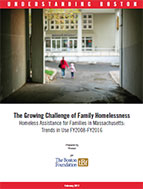The Boston Foundation releases a detailed report on the challenges of family homelessness
February 23, 2017
The report was prepared by Westat with data from the Massachusetts Department of Housing and Community Development
BOSTON, Massachusetts (February 23, 2017) – The Boston Foundation, in partnership with the independent research firm Westat and the Massachusetts Department of Housing and Community Development (DHCD), released a report today analyzing nine years of data on homelessness assistance in Massachusetts. The research, which was shared with hundreds of people at a forum this morning at the Foundation, sheds light on the number of families who need Emergency Assistance—in the form of direct shelter or programs that help them remain housed outside of the shelter system.

Indeed the stereotype of “the homeless” as individuals panhandling on corners is more inaccurate today than ever. According to the report’s primary author, Westat Vice President Debra Rog, “Families and children make up the largest cohort of people who are homeless or on the brink of homelessness in Massachusetts.” The average size of families in the system has increased, in part due to the presence of spouses. Almost 20 percent of families entering shelter in fiscal year 2016 included two adults; that figure was only 8 percent in fiscal year 2008. But children under 18 dominate the family population: On any given day, they make up 60 percent of the 13,000 people who are experiencing family homelessness in Massachusetts.
“Children are among the most vulnerable members of our society,” said Boston Foundation President and CEO Paul Grogan. “How we serve them and their parents is a reflection not only of our systems and institutions, but our character as a community.” Grogan thanked the Massachusetts Department of Housing and Community Development for its partnership in making the valuable data in the report available to the authors.
The report examines several measures of how the Emergency Assistance system is used, including not only the average length of time spent in a shelter and the frequency of returns to the system, but also which of the several types of shelter and what family demographics are apt to be associated with the extremes of those measures, as well as what trends dominate in different regions of Massachusetts (Boston, North, South, Central, West). Further, the report compares the homelessness trends in Massachusetts with trends in the nation as a whole and in two areas with similar economies and tight housing markets: New York City and Seattle/King County.
Using data merged and analyzed from several longitudinal systems, the report identifies gaps for future research to tackle. But above all it establishes a baseline.
“DHCD is proud of the progress made in reducing family homelessness under the current administration. Data on the size, nature, flow and experiences of the families receiving homelessness assistance over recent years will help the Commonwealth build on its success and can guide future decisions around policy and practice,” said Chrystal Kornegay, Undersecretary of the Massachusetts Department of Housing and Community Development.
Among the key findings:
- Since fiscal year 2008, Massachusetts has experienced one of the largest increases in family homelessness in the nation, and is one of only two states (with New York) where families comprise more than half of the shelter population.
- While new entrants to and returns to shelter have declined in the last couple of years, the length of stay in shelters has increased.
- About half of the families in shelter also receive other types of homeless assistance.
* * *
The Boston Foundation, Greater Boston’s community foundation, is one of the largest community foundations in the nation, with net assets of some $1 billion. In 2016, the Foundation and its donors made $100 million in grants to nonprofit organizations and received gifts of more than $107 million. In celebration of its Centennial in 2015, the Boston Foundation launched the Campaign for Boston to strengthen the Permanent Fund for Boston, the principal endowment fund focused on the most pressing needs of Greater Boston. The Foundation is proud to be a partner in philanthropy, with more than 1,000 separate charitable funds established by donors either for the general benefit of the community or for special purposes. The Boston Foundation also serves as a major civic leader, think tank and advocacy organization, commissioning research into the most critical issues of our time and helping to shape public policy designed to advance opportunity for everyone in Greater Boston. The Philanthropic Initiative (TPI), a distinct operating unit of the Foundation, designs and implements customized philanthropic strategies for families, foundations and corporations around the globe. For more information about the Boston Foundation and TPI, visit tbf.org or call 617-338-1700.
Westat is an employee-owned research corporation with expertise in program evaluation, statistical design, data collection and management, and research analysis. Westat is headquartered in Rockville, Maryland, in the Washington, D.C. metropolitan area, and has research offices in Bethesda, Maryland; Raleigh, North Carolina; Atlanta, Georgia; and Houston, Texas. Westat’s research, technical and administrative staff totals approximately 2,000. For more on Westat, go to westat.com.
